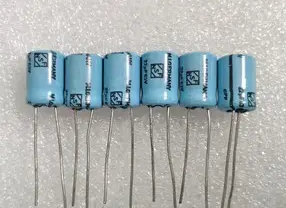OUTLINE:
Something you must know about coupling capacitor
 437
437What is a Coupling Capacitor?
A coupling capacitor is a type of capacitor used to connect the AC signal from one circuit to another circuit while blocking DC signals. Capacitors generally have the function of storing an electrical charge, and they react differently to different frequencies. For low-frequency signals like DC, the resistance or impedance of the capacitor is very high, while for high-frequency signals like AC, it has less resistance or impedance, allowing the signals to pass through the circuit easily.
Coupling capacitors are used in various circuits where the output requires high-frequency signals like audio circuits. For instance, in the case of a microphone circuit, DC power is used to provide the supply, but when a user talks through the microphone, the speech is considered as an AC signal. When the AC signals supply from the microphone to the output device, the DC signal cannot pass because this signal gives the power to the parts in the circuit. On the output end, we get the AC signal. So, a coupling capacitor is placed between the two circuits so that AC signals can be supplied while the DC signal is blocked.

To select a suitable capacitor for coupling applications, some key parameters must be considered, such as series resonant frequency, impedance, and equivalent series resistance. The capacitance value mainly depends on the frequency range of the application and the impedance of the load or source. There are different types of capacitors used in coupling applications, such as ceramic, film, tantalum, polymer electrolytic or aluminum organic, and aluminum electrolytic capacitors.
The capacitance of a coupling capacitor can be calculated using the formula Xc = 1/2πfc, where Xc is the reactance of the capacitance, C is capacitance, and f is frequency.
Coupling capacitors are used in various applications, including audio circuits, power line communication substations, PLCC equipment to connect carrier equipment and transmission lines, and in BJT for connecting two stages for amplification.
In summary, coupling capacitors play a crucial role in connecting AC signals from one circuit to another while blocking DC signals. By selecting the appropriate capacitance value and type, designers can ensure that their circuits function optimally and reliably.

Disclaimer: The views and opinions expressed by individual authors or forum participants on this website do not represent the views and opinions of Chipsmall, nor do they represent Chipsmall's official policy.

share this blog to:

